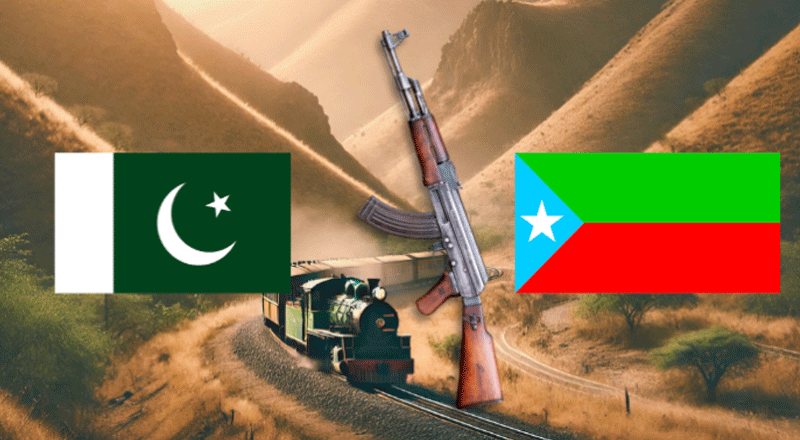A Crisis in Balochistan Escalates
In a dramatic escalation of the long-standing conflict between Baloch separatists and the Pakistani government, the Baloch Liberation Army (BLA) claimed to have executed 214 military hostages following the expiration of a 48-hour deadline. The hijacking of the Jaffar Express, a passenger train in Balochistan, turned into a deadly standoff when the BLA demanded the exchange of hostages for Baloch political prisoners. Pakistan’s refusal to negotiate led to the alleged mass execution, further intensifying tensions in the troubled region.
Baloch Rebels Blame Pakistan’s ‘Stubbornness’
The BLA, the most powerful Baloch insurgent group, accused the Pakistani government of ignoring their ultimatum and refusing to engage in serious negotiations.
“The Baloch Liberation Army had given the Pakistani army a 48-hour ultimatum to exchange prisoners of war, which was the last chance for the occupying army to save the lives of its personnel. However, Pakistan, displaying its traditional stubbornness and military arrogance, not only avoided serious negotiations but also turned a blind eye to the ground realities. As a result of this stubbornness, all 214 hostages have been executed,” the group stated.
The separatists also insisted that they had adhered to international laws of war but were left with no choice due to Pakistan’s inaction. “The BLA has always followed the rules of war and international law, but Pakistan chose to sacrifice its personnel instead of saving them,” the group added.
The Hijacking of the Jaffar Express
The crisis began when militants hijacked the Jaffar Express in a remote mountain pass in Balochistan. They blew up sections of the railway track, trapping passengers and taking hostages. The Pakistani military swiftly launched a rescue operation, leading to a violent confrontation between the army and the insurgents.
Pakistani military spokesperson Ahmed Sharif Chaudhry provided a different account of events, stating that the army successfully neutralized the threat. “Our forces killed 33 insurgents, rescued 354 hostages, and ended the siege,” Chaudhry claimed, dismissing the BLA’s assertion that additional hostages had been taken and executed. The final death toll reported by the Pakistani army included 23 soldiers, three railway employees, and five passengers—significantly lower than the BLA’s claims.
Conflicting Narratives: Who Controls the Truth?
The BLA’s claims of executing 214 hostages remain unverified, as Pakistani authorities have often accused the group of exaggerating its actions for propaganda purposes. While the army maintains that the situation was brought under control with minimal losses, the rebels insist that their mass execution of hostages was a direct consequence of Pakistan’s refusal to negotiate.
This conflicting narrative underscores the broader issue of trust and credibility in Pakistan’s dealings with Baloch separatists. The government has consistently downplayed the strength and reach of insurgent groups, while the BLA has leveraged dramatic claims to push its agenda for independence.
BLA’s Insurgency: A Fight for Independence
The Baloch Liberation Army has been engaged in a decades-long insurgency against Pakistan, seeking independence for Balochistan—a province rich in minerals and strategically important due to its China-led infrastructure projects, including the Gwadar Port and extensive gold and copper mines.
Baloch nationalists argue that while Balochistan accounts for 44% of Pakistan’s landmass, it remains the most underdeveloped and poverty-stricken region. They accuse Islamabad of exploiting the province’s vast natural resources to fuel economic growth in Punjab and Sindh while neglecting Balochistan’s development.
Pakistan’s Response and the Future of the Conflict
Pakistan has long dismissed Baloch insurgents as a security threat rather than a legitimate political movement. The government has relied heavily on military force to suppress separatist activities rather than engaging in meaningful dialogue. However, the Jaffar Express hijacking and its aftermath highlight the escalating scale of the conflict and the increasing sophistication of insurgent tactics.
With both sides refusing to back down, the likelihood of further violent clashes remains high. If the BLA’s claims of executing hostages are confirmed, it could provoke an even harsher crackdown by the Pakistani military. At the same time, growing international scrutiny over Pakistan’s handling of Balochistan’s grievances could add pressure on the government to reconsider its strategy.
A Crisis Without Resolution
The Jaffar Express hijacking serves as yet another grim reminder of the deep-rooted conflict between Baloch separatists and the Pakistani state. While the Pakistani military claims success in its rescue operation, the BLA insists that the mass execution of hostages was a direct result of the government’s unwillingness to negotiate. As the insurgency continues, Pakistan faces increasing pressure to either engage in meaningful dialogue with Baloch leaders or risk further instability in the resource-rich but volatile province. The coming weeks will be crucial in determining whether this incident leads to a renewed crackdown or paves the way for a shift in policy towards resolving the Baloch conflict.





